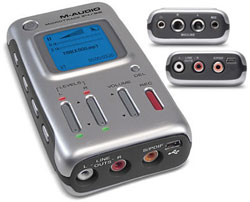Tech
A field guide to digital audio recorders
I've recorded live music events on DAT tape for years and recently started thinking about ways to modernize the process and skip the tape altogether. I've been looking for a portable audio recorder to tape interviews and record podcasts but have been frustrated with the options. Following is some of my research.


I purchased an Olympus DS-2200 voice recorder (US$289) and although the sound quality for recording interviews and podcasts is quite acceptable when using the included T-microphone, the included DSS Player software for the Mac (versions 1.42 and 6.0.4) doesn't yet work with Intel Macs.
I'd much rather have a cool little accessory for the iPod's dock connector that allows me to capture high resolution audio as I discussed here last month, but the Belkin TuneTalk and XtremeMac Micromemo still aren't yet shipping.
The other handheld digital recorders that I'm considering record straight to removable media cards which avoid the whole software fiasco and allow you to simply mount the media card, grab the raw audio files and edit away.
The unit that I'm currently coveting is the M-Audio MicroTrack which lists for US$499, but can be found for as little as US$325 on Froogle. The MicroTrack is a high-fidelity mobile two-channel digital recorder that records WAV and MP3 files to Compact Flash media.
PROS: 24-bit uncompressed recording, digital inputs, phantom powered mic pre-amps, balanced TRS jacks, RCA jacks, and it charges via USB.
CONS: Lacks a built-in mic, noisy mic pre-amp and A-to-D converter, fixed battery.
The other portable recorder that I've seen is the Edirol R-09 (US$399), a handheld 24-bit uncompressed recorder with a built-in stereo microphone.
PROS: 24-bit recording, built-in stereo microphone, removable AA batteries, SD media.
CONS: AA battery life, lacks balanced mic inputs and phantom power.
If you're looking for the highest possible audio fidelity (i.e. for live concert recording) the Core Sound PDAudio takes the cake. PDAudio records two channels of 24-bit/192 Kbps uncompressed digital audio to compact flash memory cards. The problem for Mac users is that it's a Windows Mobile-based solution. If you're looking for even more detail I recommend reading the Core Sounds comparison of all of the major digital audio recorders.
What do you use for recording lectures, interviews, conferences and podcasts?